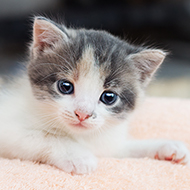Public urged not to buy kittens on impulse

There was a 667 per cent rise in online searches for 'kittens near me' in July.
Members of the public are being urged to do their research before getting a pet, as new figures reveal a sharp rise in the number of people wanting to buy or rehome kittens this summer.
According to figures published by the RSPCA, there was a 667 per cent rise in online searches for 'kittens near me' in July, a sixfold increase on the same period last year. The animal charity also noticed a sharp spike in searches for kittens during the coronavirus lockdown, with a 188 per cent increase within just a few months.
Cat welfare expert Alice Potter said: "It's fantastic that so many people are interested in bringing a cat into their home this year. However, with such high increases in people searching for kittens online, it's important that prospective owners are doing their research and not buying a kitten on impulse.
“This means making sure they have the time, money and resources to care for a cat for the rest of their lives, but also ensuring that if buying a kitten they're buying a healthy and happy kitten from a responsible breeder.”
The figures come during Adoptober, an initiative designed to showcase the benefits of rehoming a rescue pet. According to the RSPCA, there was a 114 per cent increase in the number of people searching for cats to adopt during the lockdown on its Find a Pet resource, compared to the previous year.
Alice added: "It's great to see so many people are looking to adopt a rescue cat with more than a million people visiting our Find a Pet during the pandemic.
"We are braced for a kitten season boom next year as routine neutering procedures had to be put on hold during the lockdown. This means that whilst the UK is already facing a cat overpopulation crisis, we may now see even more unplanned litters of kittens. If you've got a kitten during lockdown, it's so important to get them booked into your vets for a spay or a snip.”



 The Animal and Plant Health Agency (APHA) has updated its online reporting service for dead wild birds.
The Animal and Plant Health Agency (APHA) has updated its online reporting service for dead wild birds.